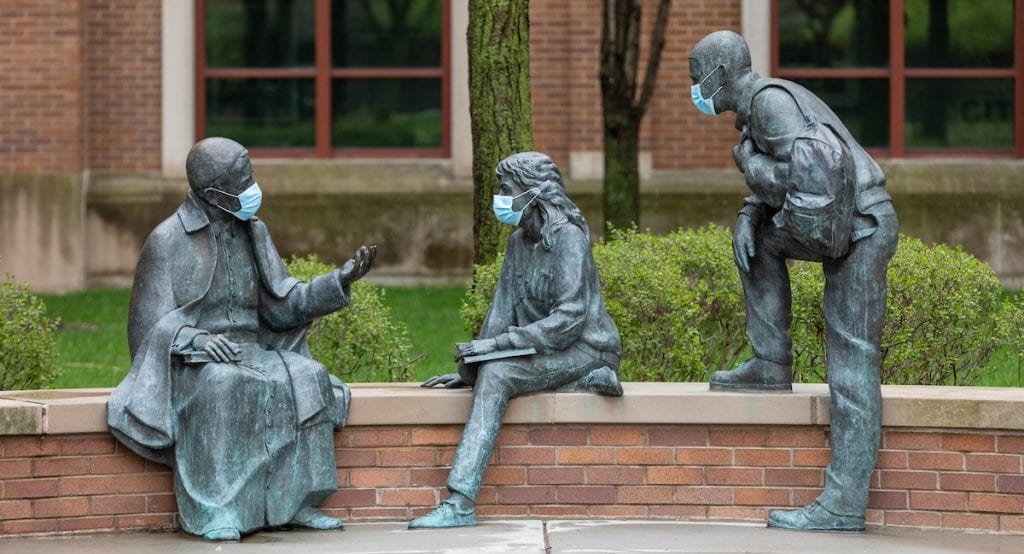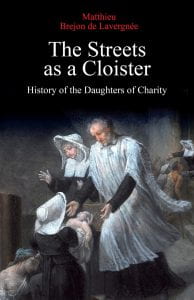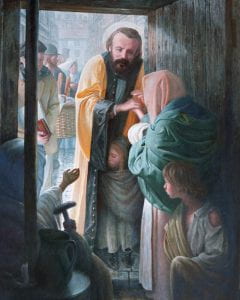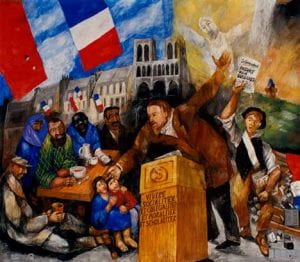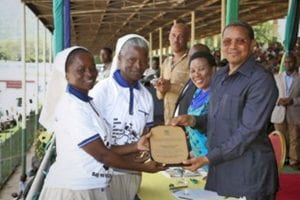I recently realized that I need to move past my habitual cynicism if I am to contribute to positive and creative solutions in overcoming challenges—in my personal life, in my work life, and as a citizen of our city and world. I am learning that in a society in which emotions increasingly seem to drive behavior, exercising thoughtful agency and intentionality in how we live and respond, regardless of how we feel, can be a great spiritual challenge.
For example, can we choose to be enthusiastic and do so authentically, even when our emotions or life circumstances might weigh us down? And, if so, will it even make a positive difference? To a certain extent the answer is yes, in that our emotional state can often change simply with a shift in perspective. Life habits, like exercise, meditation, or friendship, can also do much to cultivate enthusiasm and gratitude for what is present and possible before us. Our communities also play a vital role in helping us to cultivate and sustain an enthusiastic hope and vision. Moreover, rather than cynicism, in terms of its generative impact enthusiasm certainly tends to be more inspiring and effective in persuading others toward positive action.
Dictionaries suggest enthusiasm involves enjoyment, interest, and an energy or zest for life. Our current day understanding of enthusiasm shares something in common with what Vincent de Paul, in his day, named “zeal.” Vincent said, “if love is a sun, zeal is its ray.”[1] He seemed to see zeal as closely tied to courage and to an abiding trust in Providence, but also as something that one could acquire through lived experience and grace. Vincent once described zeal as the “soul of virtues.”[2] Zeal, for Vincent, was more than mere sentiment; it seemed to involve channeling our own conscious will and giving ourselves over to a purpose beyond ourselves. For him, this larger purpose was what he called “the spirit of the Mission.”[3]
How might we remain enthusiastic or cultivate the virtue of zeal in the face of today’s challenges, both personal and societal? As we witness the most recent destruction in Haiti, the horrific situation in Afghanistan, the pernicious gun violence in our city, the continued havoc caused by the pandemic and natural disasters like hurricanes, or the intractable systemic problems of racism, poverty, and war… and on and on… pain, sadness, and anger are perfectly understandable feelings to be experiencing. How do we get from there to enthusiasm or zeal, and why even bother?
One important reason to move towards enthusiasm is because change, whether at the personal, interpersonal, institutional, or societal level, requires it. If we are to move through and past painful emotions and work towards that which can transform, uplift, and create a new reality, we need the energy and vitality of enthusiasm. We need a certain hope and zest for life and for all that is still possible. At DePaul, as a Vincentian university, we must find a way to inspire one another to embody this “zeal.” It is our mission to prepare our graduates to become “agents of transformation throughout their lives” and to address “the great questions of our day, promoting peaceful, just, and equitable solutions to social and environmental challenges.”[4] We should consider enthusiasm, or zeal, an essential Vincentian virtue for our times.
- What are the habits that help you to cultivate enthusiasm or a zeal for life?
- How might you help to foster an enthusiasm for the “spirit of the Mission” in your own area of work, or in your circles of influence at DePaul
Reflection by: Mark Laboe, Associate Vice President, Division of Mission and Ministry
[1] Conference 211, The Five Characteristic Virtues (Common Rules, Chap. II, Art. 14), 22 August 1659, CCD, 12:250. See: https://via.library.depaul.edu/vincentian_ebooks/36/
[2] Letter 460, To Pierre Escart, in Annecy, 25 July 1640, Ibid., 2:84. See: https://via.library.depaul.edu/vincentian_ebooks/27/
[3] Conference 211, Op. Cit., 12:251.

